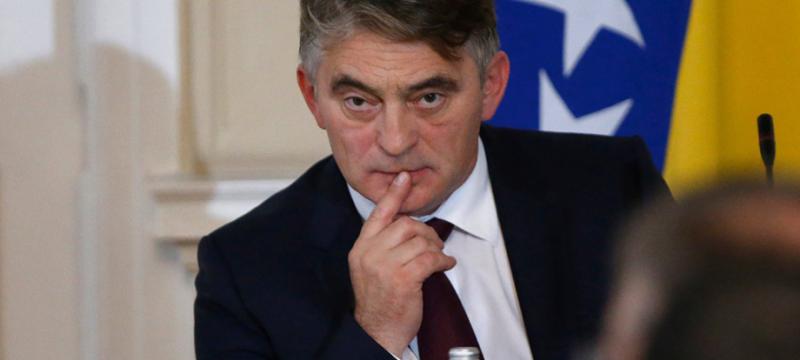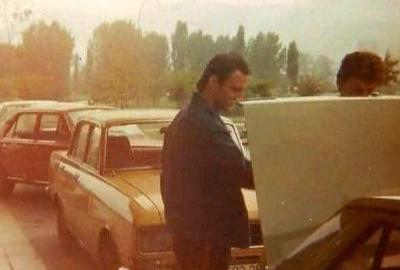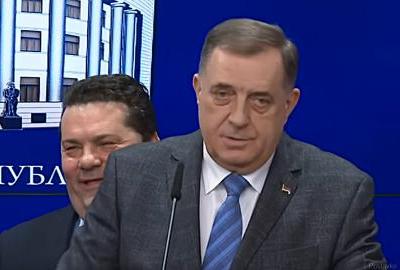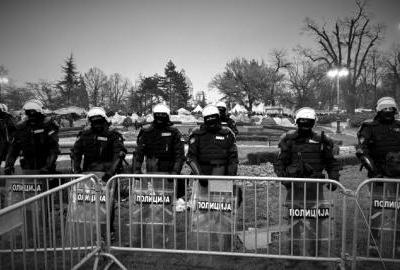Žurnal in English
IT WAS THE TIME OF ROSES: Komšić's generation
The painful post-war period was not at all painful for Komšić. On the contrary, "it was a time of roses", he had a high income and enjoyed all the privileges this state could give to anyone. As he himself says, he was “comfortable in peace” and “maybe he was too lulled and relaxed” so he forgot that the state needed to be built. How did we feel during that time?

"My generation is deeply unhappy. We lived in something that was an orderly system and stability, that gave hope. Then, against our will, we were pushed into a war that we first thought would never end. And when it was over, the opportunity to do something better was missed. We may have been tired of those events and the war, and we were comfortable in peace. (…) We forgot that when we defended the state, then it’s time for it to be built. And it's not an easy job. It means continuing to enter into conflicts, political, with those who destroy the state, abuse power, steal and make fools of you if you are a nice and decent man, they show you that you cannot succeed in life that way. (…) Maybe as a generation we were too relaxed, lulled, maybe we expected the international community to make us a state, but then we sobered up and saw that they would not and found ourselves in a situation of what to do now. "
TALKIN ABOUT MY GENERATION
This is what Željko Komšić said in an interview with Deutsche Welle. It looks like a "warm human story", an "opening of the soul" of a statesman who tells the tragic fate of the entire generation to which he belongs. Pigeon-heart warriors wipe away tears, Twitter is dumbfounded, by then furious bots, are creating touching patriotic montages.
For the first time, although completely unknowingly, Komšić made some rather original statements in this interview. There are even some parts of this statement that are correct. For example, it is true that we have been pushed into war. It is also true that we thought it would never end. It is also true that, when the war ended, we missed an opportunity to do something better. But, from that moment on, the experience of the tragic generation mentioned by Željko Komšić himself is radically different.
What generation is he talking about? He was born in 1964, which is quite close to my age, so I can say that I know to some extent the experience of some of its members.
After surviving the war, that generation tried to survive its consequences. In order to "make something better" out of their lives, one part of them decided to go abroad, which proved to be a reasonable decision. They learned languages, got used to the new environment and customs, were educated, employed, improved, advanced and are now already preparing for retirement, peaceful and deserved. The other part stayed in Bosnia and Herzegovina, learning new transitioning rules, trying to get used to the new environment and customs, looking for a job, suffering, living day to day and now waiting for a restless pension while thinking about whether their employer paid their pension insurance and whether there will be a new war. The part of the generation that decided to view the war as an empty space and tried to connect the two ends of the life course, the one before and the one after the war, had the hardest time. It took them a long time to realize that the cut was too violent, that the ends were irregular and did not fit into each other. Years passed in those attempts, they did not cope, the transition tore them apart.
DAYS OF WINE AND ROSES
How is Željko Komšić's career going after he survived the war and was awarded the Golden Lily? He was the president of the Sarajevo City Council, the mayor of New Sarajevo for two terms, the ambassador in Serbia and a member of the Presidency of BiH for three terms. In the breaks between positions, there was some kind of MP, it is not known exactly where, because, during his mandate, he never showed up for the podium. He was a prominent member of one party, he left it and founded a new one, so he sided with one, the other and the third, danced left, right, in the middle, then more to the right, always calculating not to endanger his own position at any moment. The whole painful post-war period was not at all painful for him. On the contrary, "it was a time of roses", he had a high income and enjoyed all the privileges this state could give to anyone. As he says, he was "comfortable in peace" and "maybe he was too lulled and relaxed." That is how he spent the best and most productive years of his life.
On the other hand, the generation that Željko Komšić is talking about was not at all comfortable and at no time were they allowed to relax. They suffered crises, blockades, negotiations, agreements, coalitions, pre-election tensions, national provocations, party skirmishes, days of this and that… they were constantly warned that the enemy was not sleeping and that there was no relaxation. The quarter of a century that has passed since the war has never been a time of peace for them but a post-war period. They spent the best and most productive years of their lives in it.
As we can see, these two experiences do not match. Because it's not about the same generation.
The generation that Komšić is talking about, because he belongs to it now, is a privileged, spoiled class that lives outrageously better than the average standard of the population, that does not have time to do the job for which it is paid because it spends every second just building a better life for itself and its family members. Komšić's confession that they "forgot that the state should be built" is the final confirmation of an insider that these are parasitic organisms that survive by lightly killing their host. It is about, to be quite clear, parasitism and not patriotism.
HARD DAYS NIGHT
In a particularly patriotic part of the conversation, he says: "I can't let anyone split and destroy my country." It seems that the balloon, in which he spent all this time, does not show that the country is already thoroughly divided and even more diligently destroyed, thanks to the passivity of those who have committed themselves to take care of it. When he says that they have finally "sobered up", he does not announce any change even then, because he admits that at the same time they are wondering "what to do now". Well, after a quarter of a century of drunkenness, the hangover has finally arrived, but they don't know where to go because of the headache. That is why they are again asking someone else to do the job for which they were paid, so that someone can grab them by the hand and return them to the VIP booths. We have received another valuable insider testimony about how unscrupulous this generation of politicians is. The fact that Komšić utters it in this way, without shame or anything like that, also shows how detached he is from reality.
It is clear that in this interview, Komšić is animating his electorate. Again, nowhere does it offer any way out of this crisis, just empty patriotic phrases. He knows from experience that it works, when he says that he will hit someone on the fingers or leave the interview, he immediately becomes the person of the day in the favoured media and the star of social networks. After these outbursts, he returned to his daily activities of "relaxing and rocking."
As for the generation he tried to hide behind, in an interview with Deutsche Welle, nothing new can be said about it. Because that generation no longer exists. It disappeared while the party was still rattling.
(zurnal.info)








